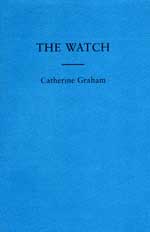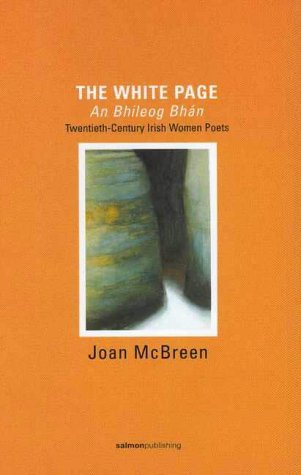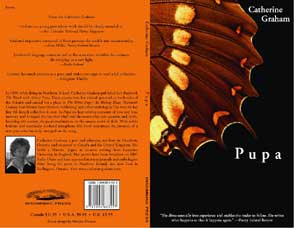|
POETRY:
-
In the Dark (Tightrope Books) 2006
-
-
Coming
Up For Air (Cranberry
Tree Press) 2002
This poem was chosen for poetry anthology contest.
-
This
I Believe (Mini Mocho Press) 2001
-
The White
Page / An Bhileog Bhan: Twentieth Century Irish Women Poets (Salmon
Publishing) 1999
Poets include: Eavan Boland, Iris Murdoch, Medbh McGuckian
-
Signals:
An Anthology of Poetry & Prose (Abbey Press) 1997
Authors include: Michael Longley, Robert McLiam Wilson, Ian Duhig
-
Aireings
(U.K),The Annex Echo, Beneath the Surface (McMaster University), Books
Ireland, CBC's Sounds Like Canada website, The Danforth Review, Descant, The Fiddlehead,
The Frogmore Papers (U.K.), Hammered Out, InCognito (Ireland), Junction
Arts Festival,
LRC (Literary Review of Canada), Leaf Press, Parameter Magazine (UK), Quills, Spire Poetry Poster, The
New Quarterly, The
Oakville Beaver, Oasis (U.K.), Perihelion, Poetry Ireland Review, Poet's Market 2007.
WORKS IN PROGRESS:
-
Novel
- Poetry Collection (Forthcoming 2008)
CRITIC'S COMMENTS:
What the critics
have said about Catherine's first book of poetry, Pupa:
Pupa,
Catherine Graham's first book length collection has much to recommend
it. Graham has the haiku sensibility: not the Orientally measured form
which, in English, can appeal only to the eye, but the talent for the
evocative image succinctly expressed… Her best work is at once
brief, yet resonant…the sophistication of their brevity, remind
me of Roethke.
The
second section, Pupa, groups poems variously around "doll"…Graham
also reminds us of the way we use our dolls: their life is one we make,
we tell our secrets, vent our angers upon them or pretend they worry
or anger as we do, and use them to image or understand the grownup world.
But dolls, we recall, are mute, imprisoned; their life is only in our
imagination. Our first babies, they have dead eyes.
Imago,
the third section of the book, represents the adult, the winged poet,
emerged into sexual and social maturity…The last poem of the section,
"Imago", represents the energy of emergence, refigures the
basic moth/butterfly image of the book, and, placed where it is, celebrates
the emergence of poetry.
-from
The Fiddlehead - M. Travis Lane
Young poet Graham's Pupa
is a debut collection of graceful concision and surprising wisdom…The
15 short poems in the section Pupa imagine a strange, haunting netherworld
of dolls, and the concluding Imago section completes the poet's work
with the exhilarating, self-birthing, final words:
Pump in air,
escape the crippling,
Drain of red. It's time, it's time.
Dew receives meconium.
Dawn the quite. Imago. Up.
-from the
Times-Colonist (Victoria, B.C.) - Joseph Blake
Like Dalton, Catherine
Graham tends toward concision and careful attention to sound, though
she's more circumspect in approach and more sardonic in attitude
The poems in Pupa, her first collection, are spiky little meditations
so taut and tightly controlled they are almost claustrophobic…The
poems' effect is all the more intense as a result. As she puts it
in one passage, "Grief is like waiting for fifty / giant black
kettles to boil."
Graham started publishing her poetry in British and Irish journals
and anthologies, so she's probably better known overseas than here.
This impressive collection should put her on the Canlit map.
-from The Toronto Star- Barbara Carey
Full review available on-line
In her powerful
new collection, Pupa, Catherine Graham continues to explore the journey,
through mourning the deaths of her parents that she began in her previous
chapbook, The Watch…
Like the enigmatic beauty of a sad smile, the poet attaches many-layered
meanings to everyday objects and activities…Several poems focus
on dolls in which the poet skillfully distills the pangs of childhood
and womanhood alike…. Themes of forced silence and smiles make
the dolls the repositories of a woman's anguish.
But the beginning of new love completes the collection. A lover's
eyes stand out as, "cornflowers blossom in a crowded room,"
a lover playfully shampoos a woman's hair to her "pleasured cries
for help."…
Graham's jewel-like poems reflect facets of loss, grief, and love.
-from Independently
Reviewed - Janice Battiste, New York
What the critics
have said about Catherine Graham's first poetry chapbook, The Watch:
The
collection is a sequence of (mostly) elegiac poems on the deaths of
both mother and father. If quiet in tone, the poems are certainly not
quiet in spirit: the language is intimate, direct and colloquial. Lyrical
and narrative, the poems employ metaphor and rhythm subtly and evocatively,
giving the apparently prosaic a transcendent emotional relevance, allowing
grief a form in discrete images and well-turned lines … "The
Sweater" epitomizes Graham's elegiac art: not transcending grief,
but not allowing grief to render the sufferer silent; memorializing
the tragic fact of life; assenting even to that.
Graham
employs careful language, often beginning with a token to sound a well
of memories - buttons, the unbroken watch recovered from her father's
fatal car accident, the Christmas gift of a sweater worn at her mother's
funeral…poems display dense, complex moods, as in "Undertow"
and "Black Kettles", with startling dove-tailed images…poems
modulate the grief and present a character with telling strokes: the
grandmother in "Red" is a gold-toothed gardener who tolerates
thistles…Eight-year olds witness the father flipping a run-over
toad in "mid-leap stretch" from its "tarmac skillet"
(Pursuit of Grasshoppers)… Now returned to her native southwestern
Ontario Graham is a young poet whose work should be closely attended
to.
-from Arc, Winter, 2002 - Cheryl Sutherland
Unity of theme
makes this a satisfying chapbook. It's a sequence about the poet's
parents and is coloured throughout by love and loss. Moving anecdotes
are faithfully recorded and Graham's impressive command of form prevents
the tumble into sentimentality. The words of her poem "Back to
the Quarry" draw attention to her method: "Dive in. Become
one with water before it freezes." She dives sensually into experience
and enables the reader to follow. She writes what happens so that
it happens again. It's an appealing collection, full of telling and
specific detail.
-from Poetry Ireland
Review 61 - Aine Miller
…work by
Michael Longley and Brendan Kennelly, and their latest batch of pamphlets,
which includes work by Joan Newmann and Catherine Graham, help seal
its reputation as a publisher of quality…The Watch is prefaced
by a quote from Raymond Carver on the passage of time ("Time
was, time was, those ragged birds cry"), and certainly the theme
of transience and loss pervades throughout…The title poem, The
Watch, is a powerful evocation of her father's death in a road accident.
Here the narrator is well under control and the image-maker comes
to the fore:
|
Later,
after the black skid…
My father's watch, still ticking,
unzipped from the O.P.P.'s plastic.
No cracks, the glass smooth to touch.
Dry mud-flakes sprinkle like ashes
On to my opening hand.
|
Strong, too,
is the imagery in Black Kettles, the last poem in the collection.
Graham tells us that "Grief is like waiting/ for fifty black
kettles to boil", and we certainly feel the gradual resolution
in each of these poems. Graham has much promise as a poet, and makes
one eager to read a full collection of her work.
- from InCognito,
Volume 2 (Dublin, Ireland) - Nessa O'Mahony
Graham's poems
swoop down cleverly on the ordinary, and unpraised; memory is important
here:
|
This
surface for long-legged spiders
once cleansed adolescent skin.
Plunge into this limestone museum.
Mingle with rusty 1890's machinery…
- "Back to the Quarry"
|
…language resurrects and at the same time revivifies the ordinary,
the every day, in a new light:
His handy
use for Taster's Choice empties.
A coin-relay from his coat or suit pockets,
to the nicked bone china saucer
until he poured the overflow into another jar…
- "Small Change" |
-from Books Ireland,
April 1999 - Fred Johnston
back to top
|
![]()




